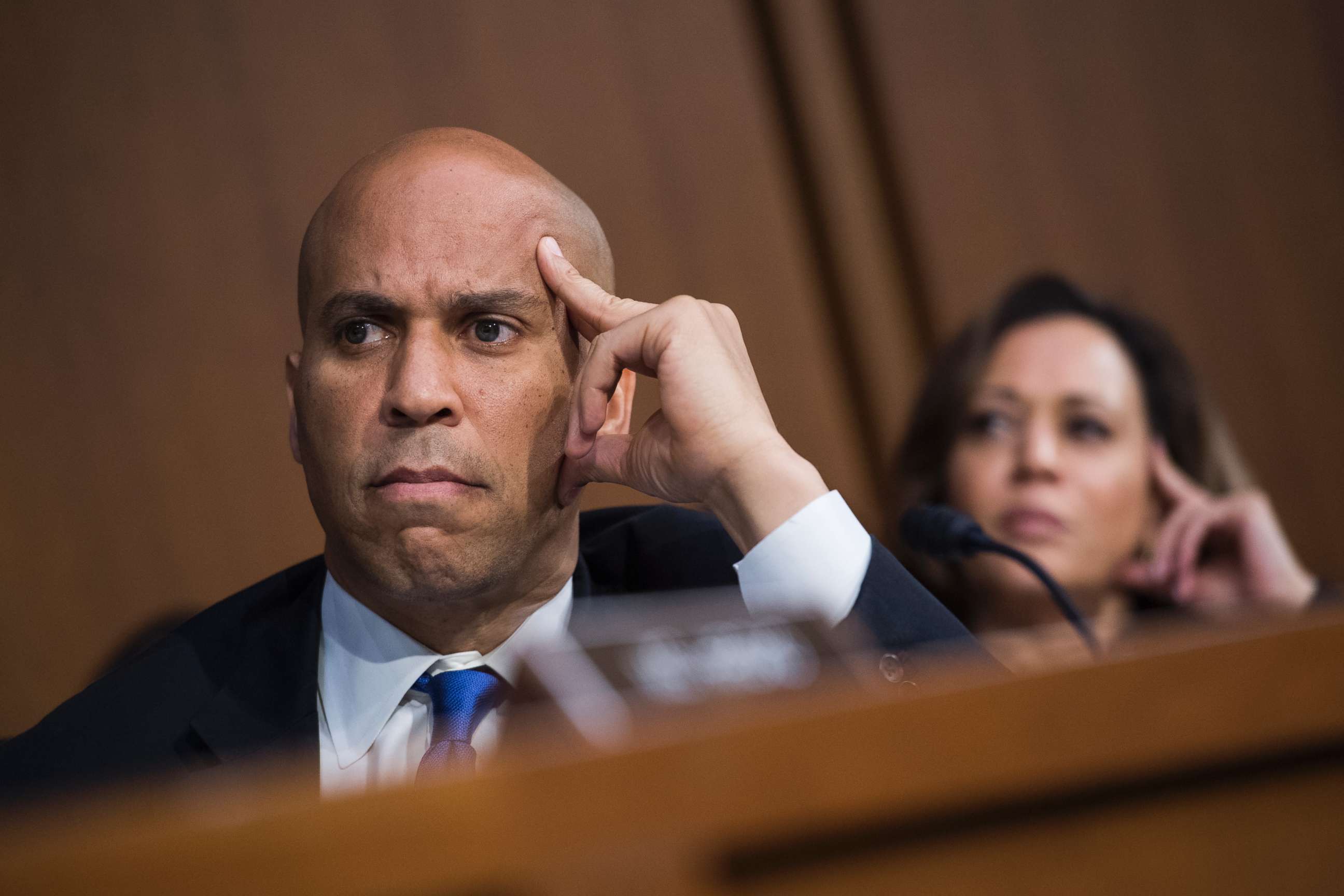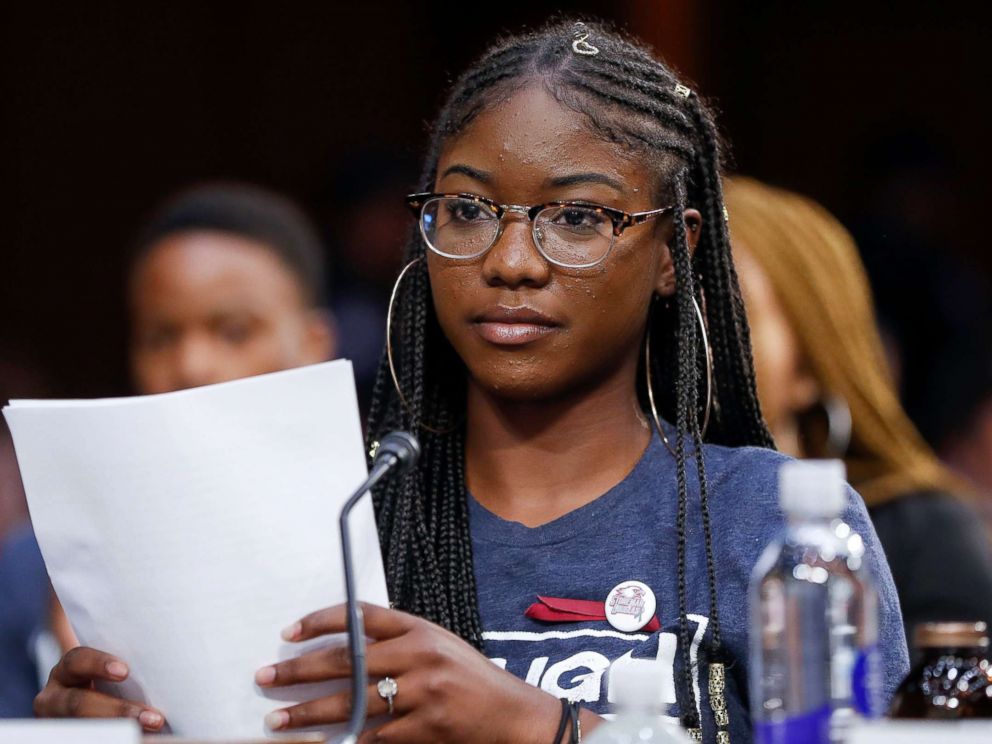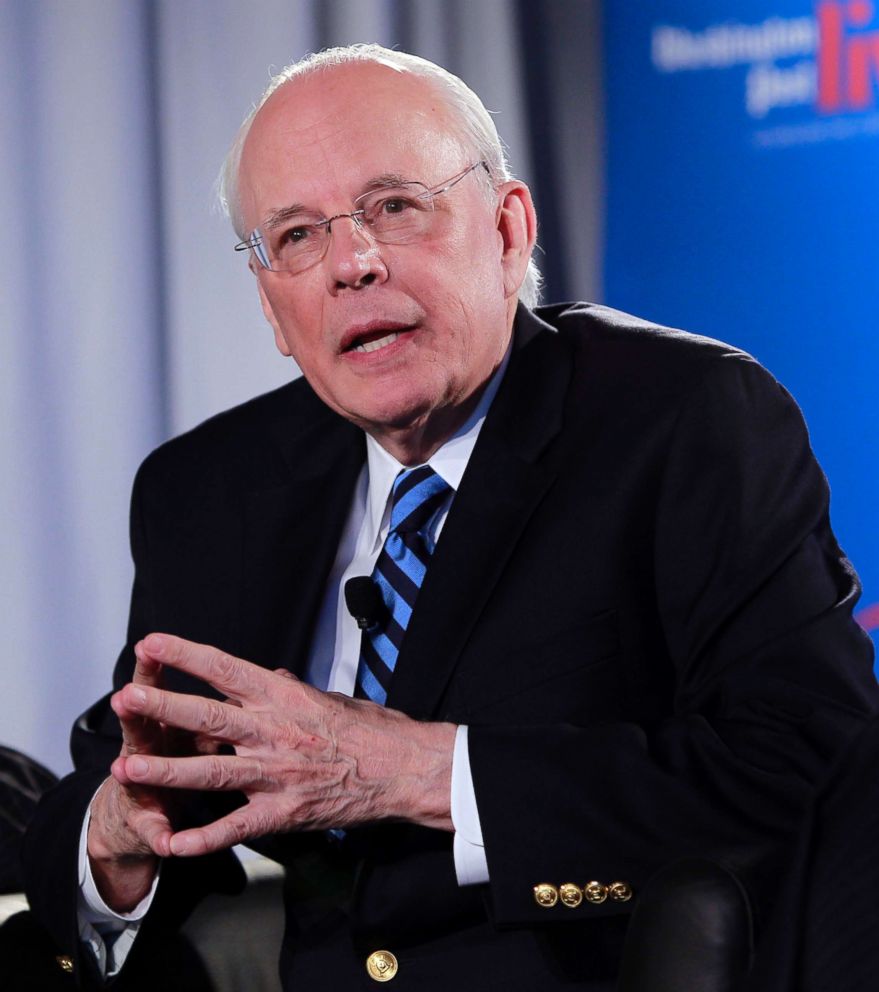John Dean warns of unchecked presidential powers if Kavanaugh confirmed for Supreme Court
The former Nixon White House counsel testified at Friday's Kavanaugh hearing.
After three days of senators sparring and sharp questions for President Trump’s Supreme Court nominee, Brett Kavanaugh's confirmation hearing continued Friday with outside witnesses, including former Nixon White House Counsel John Dean, who warned of unchecked presidential powers if he is confirmed.
Day four — which is designed not to change minds, but to buttress already firmly-held positions — began with a show of decorum on both sides, and with fewer interruptions from protesters than when Kavanaugh testified.
Among the experts were law professors and Kavanaugh’s colleagues in the legal world, Congressional Black Caucus chairman Rep. Cedric Richmond, Parkland student and survivor Aalayah Eastmond, and a disability rights advocate.
Delving deep into the specific implications of key decisions in cases that mark Kavanaugh's long career as a judge, the experts offered a picture of two different men. One Kavanaugh — a brilliant, "scrupulously balanced" jurist, teacher, loyal friend, and champion of diversity. The other Kavanaugh — the radical judge who is an existential threat to women’s reproductive health, minorities of all stripes, and who "represents a grave legal danger," according to Richmond.
The two Brett Kavanaughs
Witnesses called by Democrats underscored concerns about Kavanaugh's record on issues including affirmative action, voting rights, and civil rights for women and those with disabilities.
Under questioning from Sens. Kamala Harris, D-Calif., and Cory Booker, D-N.J., Richmond agreed with concerns that Kavanaugh would be a threat to people of color.

"Among the troublesome constitutional interpretations Mr. Kavanaugh has penned while on the bench, his record on affirmative action is particularly disturbing and ripe for intense scrutiny," Richmond said.
Pointing to Kavanaugh's decision in the case of Doe v. District of Columbia, Elizabeth Weintraub, who was born with cerebral palsy, told the senators, "Judge Kavanaugh could have supported the civil rights of people with disabilities and this requirement, but he failed."
"If Judge Kavanaugh is confirmed I am afraid that might right to make decisions for myself will be taken away," she added.
Alternating experts laid out polar-opposite views, with those invited by Democrats universally raising red flags against the nominee as a conservative who will, among other things, tank health care policy guaranteeing coverage and overturn Roe v. Wade or kill it by what New York University Law School professor Melissa Murray, a former clerk to Justice Sonia Sotomayor, warned was "death by a thousand cuts."
Witnesses called by Republicans characterized Kavanaugh as a valuable addition to the Supreme Court.
Yale Law professor Akhil Amar said that Kavanaugh, perhaps more than any other Republican sitting judge on the bench, has studied the Constitution "with more care."
"It's not just that he will be good on his own, he will help bring out the best in others," he added.
Amar also strongly argued that Kavanaugh should not promise an opinion on the issue of recusal when it comes to President Donald Trump's executive power.
He said that decision should be made when and if a criminal or civil case involving the President were to be brought to the High Court, noting that while the late Justice William Rehnquist recused himself from the 1970’s era case that forced President Nixon — who had nominated him — to comply with a subpoena, two other Nixon-appointed justices did not.
After the American Bar Association unanimously gave Kavanaugh its highest rating of well-qualified, when asked if Kavanaugh was "mainstream," the ABA's John Tarpley said, "Absolutely - he’s at the top of the stream."

Affirming those sentiments, attorney Ted Olson said, "[Kavanaugh] possesses and consistently has exemplified the qualities" he believes would make a good justice.
The subsequent panel featured Eastmond, who recounted the chilling moments during the shooting inside Marjory Stoneman Douglas high school to challenge Kavanaugh's stance on guns.
Asked by Sen. Richard Blumenthal, D-Conn., who consoled the victims of the Sandy Hook shooting in his state, about what she would say to Kavanaugh, the Parkland activist replied, "My life, along with all the other youth, is more important than that gun."
Attention was riveted on her as she said, "If Kavanaugh doesn’t even have the decency to shake hands with a father of a victim, he definitely won’t have the decency to make life-changing decisions that affect real people."
Dean returns to the Senate to shield 'good government'
In a complete reversal from Thursday’s raucous hearing, during which Democrats staged a protest over the trove of documents related to the nominee’s time in the Bush White House that were marked "committee confidential" and have not been released to the public, Friday did not bring similar fireworks.
But John Dean's presence signaled the Democrats' commitment to thwarting a Kavanaugh nomination to the nation’s highest court.
Dean served as President Nixon's White House Counsel and played a key role in bringing Nixon down after cooperating with prosecutors. Democrats called him to testify to speak on the limits of presidential power and how it can be abused.
"There is much to fear from an unchecked president who is inclined to abuse his powers," Dean said in a statement to the Senate Judiciary Committee. "That is a fact I can attest to from personal experience."

With the cloud of the Mueller investigation hanging over the Trump presidency, Kavanaugh was asked Wednesday by Sen. Chris Coons, D-Del., about the power of the presidency.
Coons wanted to know if a president can fire a special counsel "at will," and Kavanaugh responded, "I have never taken a position on indicting or investigating a sitting president."
Dean fiercely outlined his case against Kavanaugh, citing a history of judicial opinions that he said show his pro-presidential powers position.
"If Judge Kavanaugh joins that court, it will be the most pro-presidential powers-friendly Court in the modern era," he said at the hearing.
"Under Judge Kavanaugh’s recommendation, if a President shot somebody in cold blood on 5th Avenue, that President could not be prosecuted while in office," he added.
Often drawing parallels between the Trump era and the Watergate scandal under Nixon, Dean was repeatedly questioned about the role of the Supreme Court in checking presidential power.
"We would’ve had a very different history if the Supreme Court did not deal with the tapes case as it did," he said.
Fearing an already unchecked president under Trump, who "could care less about the rule of law," according to Dean, Kavanaugh could become a crucial figure in expanding that power.
"I could see [Kavanaugh] as the leader of the 5-4 that would enhance presidential powers," he argued.
Across the country, the president weighed in on the process, assailing Democrats' opposition to Kavanaugh during his rally in Fargo, North Dakota Friday.
"The way they are screaming and shouting, it is a disgrace to our country actually," Trump expounded to the cheering crowd. "I don't know if anybody has been watching it. They are making fools out of themselves.
"The man is extraordinary," he added of his nominee.
Republicans hope to confirm Kavanaugh by the end of the month before the Supreme Court's new term begins in October.



